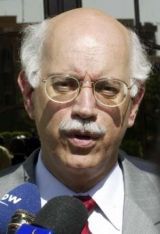US Natsios hails Chinese cooperation, unveils Sudan Plan B
April 11, 2007 (WASHINGTON) — China increasingly is cooperating with the United States toward ending the violence in Sudan’s Darfur region, while President Bush “wants action” and is prepared to impose further sanctions on Sudan, says Ambassador Andrew Natsios, the president’s special envoy to Sudan.

That cooperation is becoming increasingly important to Bush, whom Natsios said was “angry” over Sudanese President Omar al-Bashir’s refusal to allow an AU-U.N. hybrid peacekeeping force into the Darfur region, where civil conflict has raged since 2003. Since fighting began, there have been more than 200,000 deaths and millions of displaced persons, he said.
Senate Foreign Relations Chairman Joseph Biden asked Natsios what the new sanctions, which have been dubbed “Plan B,” entailed, and Natsios said there would be a series of sanctions against Sudanese individuals and companies that “would be phased over time, depending on how things go.” He said a great deal depends on what the Sudanese government chooses to do regarding peacekeepers.
Natsios said that the “only way to deal with this is ultimately a negotiated settlement, because over the long term, we have to have some kind of an agreement between the people who live there, who have been at war with each other.”
Natsios said he worked closely at the United Nations with Chinese Permanent Representative Wang Guangya on Darfur. Wang, whom Natsios said has become “a personal friend,” played “a vital role” in helping broker a compromise in November 2006 that Bashir “appeared” to accept, calling for a larger U.N. peacekeeping force into Darfur, he said.
In addition, Chinese President Hu Jintao, during a recent visit to Khartoum, “encouraged Bashir to show flexibility and allow the AU-U.N. hybrid force to be deployed,” Natsios said.
Natsios said that in January he visited Beijing, where he had “positive” meetings with Chinese officials, including State Councilor Tang Jiaxuan and Assistant Foreign Ministers Cui Tiankai and Zhai Jun. Natsios said he made it plain that U.S. interests in Darfur are “solely humanitarian,” adding, “We have no economic or military interests behind our policies.”
If, however, cooperative persuasion fails and “Khartoum remains intransigent,” Natsios said, “we look to Beijing to join with the international community in applying more forceful measures.”
“If we see a deterioration in the Sudanese government’s attitude and cooperation” toward deploying peacekeepers in Darfur and reigning in the Janjaweed militias that have caused much of the violence, then sanctions will go into effect, he explained.
As of now, Natsios said the following measures are proposed:
– Personal sanctions, involving travel bans and confiscation of bank accounts, against one rebel leader, “a dangerous extremist … who is obstructing” the peace process in Darfur, and two war criminals, “whom we believe have committed terrible atrocities.”
– Economic sanctions against 29 “very powerful” companies owned by the Sudanese government “through which a lot of money moves, particularly oil revenues.” They will be affected because all international oil transactions are in dollars and “they have to go through American banks,” where the money monitoring portion of the sanctions will catch them.
– New enforcement regulations that will help enforce earlier U.S. sanctions against Khartoum as well as those under Plan B. These are new money-moving mechanisms developed in the struggle against terrorism and illicit drugs.
Natsios said he believed the Plan B sanctions would have a “substantial effect” on the Sudanese economy because similar sanctions, with strong enforcement provisions by the Treasury Department, “are having an effect on the Iranian and North Korean economies.”
Asked when Plan B would be implemented, Natsios said the United Nations requested two to four weeks to see if the current round of Darfur negotiations meets with success, and “as a courtesy to the U.N. secretary-general we agreed to that delay. But there is a finite limit, and if we continue to see stonewalling then those measures will be implemented.”
The full text (PDF, 47KB) of Natsios’ testimony, as prepared for delivery, is available on the Senate Foreign Relations Committee Web site.
(USINFO)
